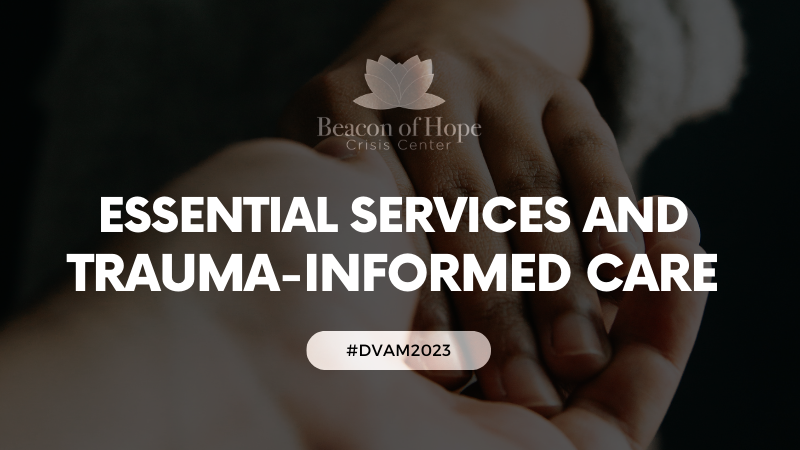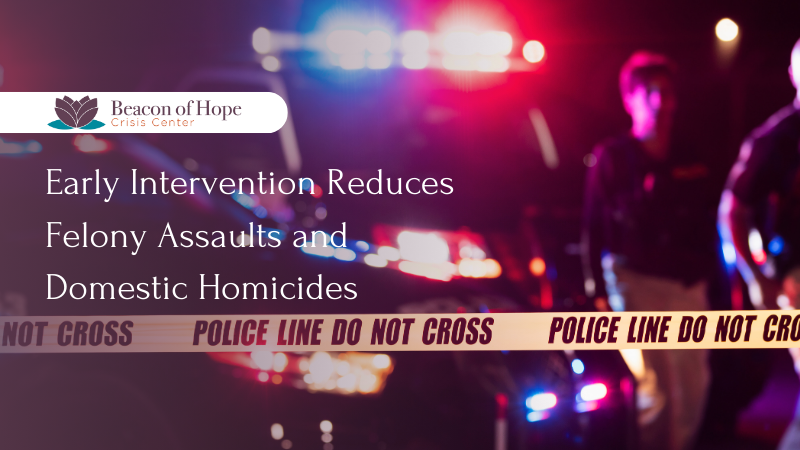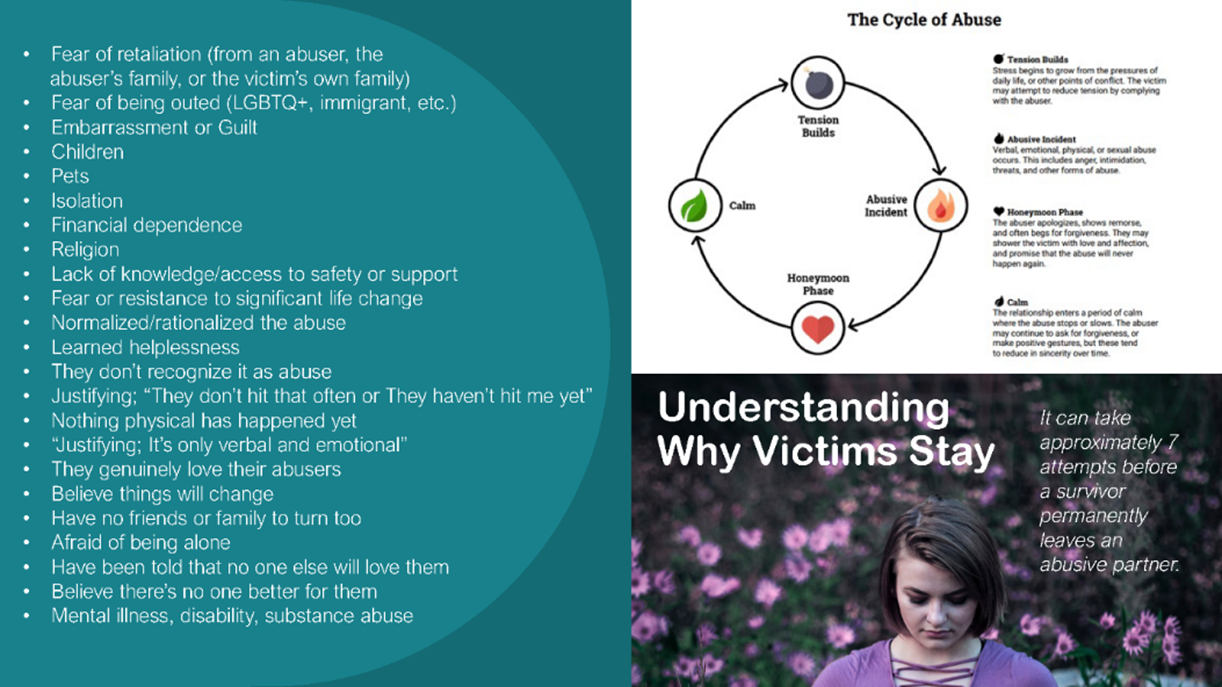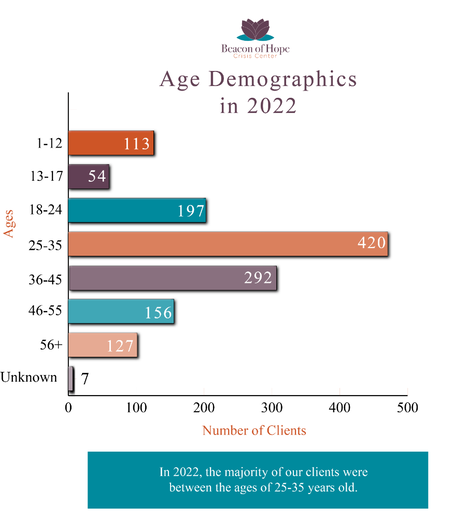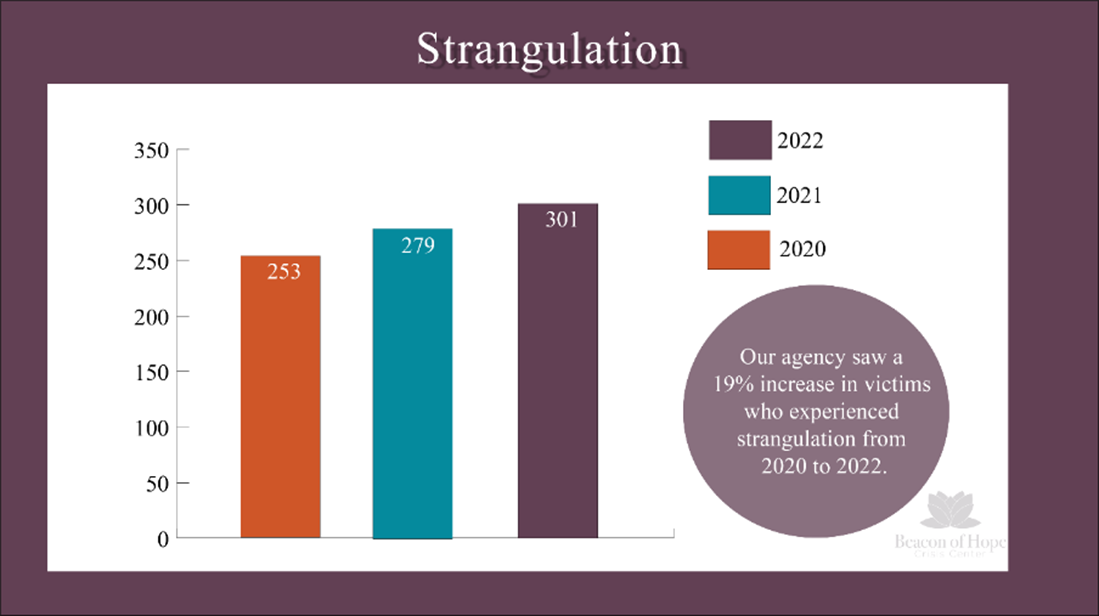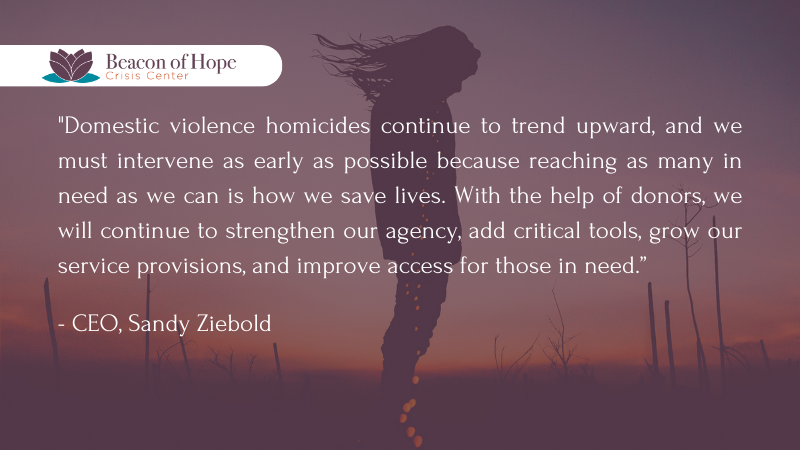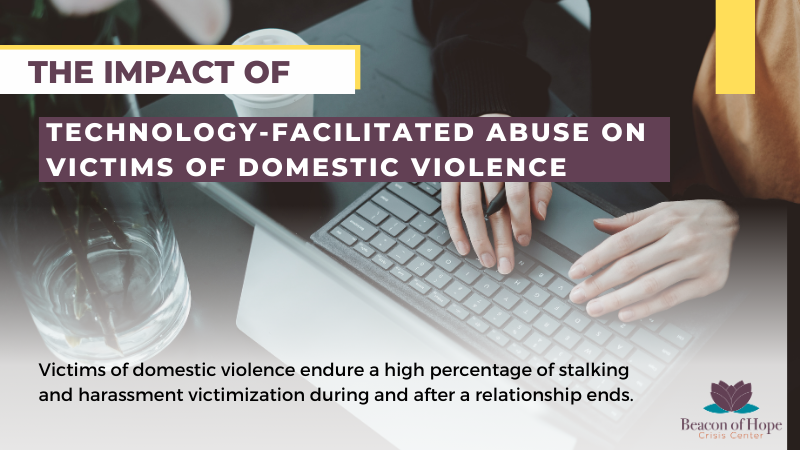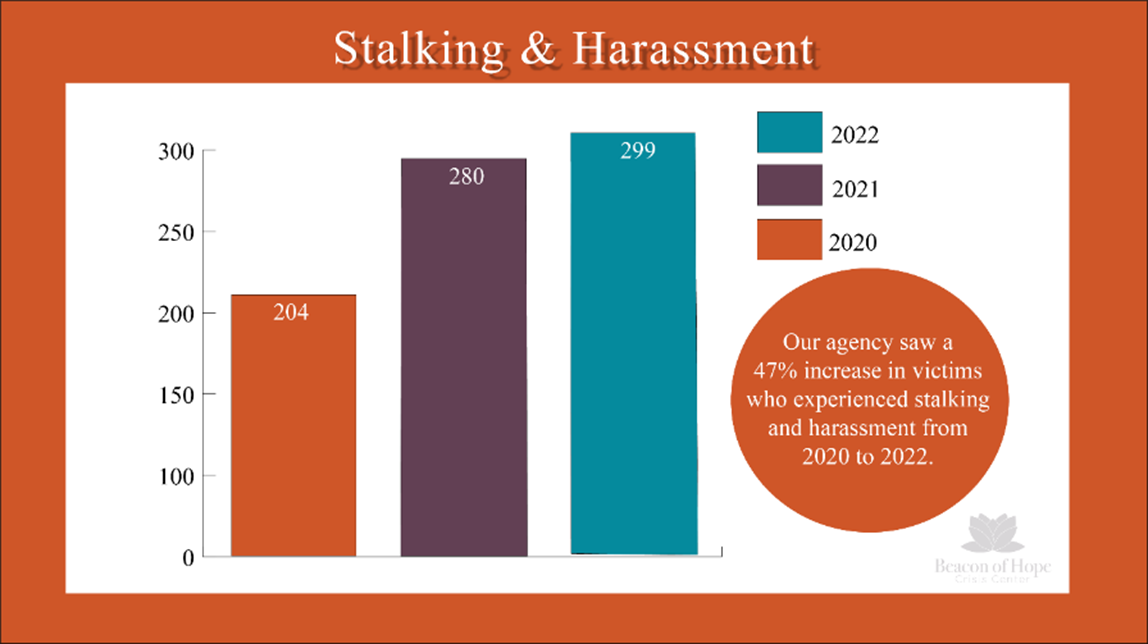|
By: Cheyenne Taylor and Savannah Archer Trauma-informed care describes an approach in health care and social sectors that reviews a person's life experiences to provide the most effective outcomes. At Beacon of Hope Crisis Center, we understand that each victim is different and unique and has varying preferences for how they would like to be supported. We recognize that we will not hear every detail of a victim’s background and that every person we encounter has their own story and history of trauma. We let victims lead and never force them to do anything. Victim advocates show up to help victims learn about abuse, identify options, and make personalized plans that meet their needs. We do our part to give them the tools to empower them to make the best decisions for themselves. Victim advocates also do their part to engage in continued training and education to help victims in whatever they face. For example, victimization from an intimate partner increases a victim’s risk for depression, PTSD, substance use, and suicidal ideation (National Center on Domestic Violence, Trauma, and Mental Health). The effects of domestic violence and sexual assault can be more complicated by factors including mental health, addiction, ability, race, immigration status, cultural beliefs, and more. Keeping these things in mind encourages us to check in with victims physically and mentally. This is also why we’ve enhanced our adaptability to serve all victims. Beacon of Hope Crisis Center has translated materials to raise awareness, interpreters are readily available, and our website has integrated Recite Me assistive technology to enable our web visitors to customize their digital experience to suit their needs.
The impacts of COVID-19 have also put additional stress on victims and their families. Victims are struggling to find housing, employment, and healthcare. These are all essential to maintaining independence and alleviating mental health crises. We are grateful to offer victims free domestic violence and sexual assault counseling. However, some victims need mental health resources with treatment for different conditions, medication, and an approach with a healthcare team. Victim advocates have also strengthened healthcare referral options, including helping victims obtain insurance, connect with a primary care doctor, access emergency healthcare, and, when necessary, connect to specialists for head, neck, and strangulation injuries. We help victims find affordable housing and new and better employment, learn about credit, and work toward their financial goals. To do those things, mental and physical health come first. Many victims are used to ignoring or pushing their own needs aside. Through the intake and follow-up process, we encourage victims to care for themselves, as it is an essential part of their healing journey. We could not make progress for those in need without building rapport, listening, and recognizing there is always more to learn. We often see that when a victim contacts us for help, it is not the first time they experienced victimization. Children who witness violence have a higher chance of experiencing abusive relationships or becoming abusers themselves. Additionally, people who have experienced abuse previously in relationships have a higher risk of revictimization (National Library of Medicine). Asking about their history of violence can help us identify solutions, which might help them process current and past trauma. No matter how long it has been since the abuse occurred, victims deserve access to confidential support, free services, and help navigating the next steps without judgment. There are no timeline criteria for victims seeking our services. Whenever they are ready, we are there to listen and believe them. By: Cheyenne Taylor and Sandra K. Ziebold When discussing crime and prevention in domestic violence, we must discuss escalation. Escalation describes when abuse intensifies, either suddenly or gradually. It can also include perpetrating another form of abuse. Victims might stay with their abusers because they believe they can "handle" the abuse. They think things will improve and be how they used to be or blame themselves. When abuse escalates, victims might start realizing they do not have control and feel trapped in the relationship. Escalation also occurs when victims are considering leaving or have attempted to end the relationship. Reports show that 75% of all serious injuries in abusive relationships happen when the victim ends the relationship (National Domestic Violence Hotline). Identifying abuse is happening is the first step to getting help, but finding the courage to leave with limited self-confidence can be extremely challenging. We encourage victims to connect with supportive services to plan their exit, discuss the abuse to build their network, speak with professionals, and take necessary belongings when fleeing. Abuse thrives behind closed doors. Perpetrators of domestic violence rely on the silence of their victims to keep them trapped in the cycle of violence. As allies, we can all be there to listen and believe victims who come forward to report, seek help, or talk about their experiences. Our efforts here at Beacon of Hope Crisis Center are heavily focused on those most at risk of violent domestic violence victimization. In partnership with law enforcement, we are helping to reduce violence and the chance of felony assaults and domestic homicides by working to intervene early before domestic violence escalates. Providing victims with intervention and prevention services helps to reduce crime in our community. It can take approximately seven attempts before a victim permanently leaves an abusive partner. Many factors are at play, and the risk of death is highest when fleeing. The earlier we can intervene and provide mitigation options for all the barriers facing these victims before the violence escalates, the better for us all. The harm to pets, children, and primary victims is exponential, and with each passing day and traumatic incident, the damage compounds. It's more than the horrific long-term trauma, physical life-altering harm inflicted on many and the risk of death; it is also the shaping of the minds and behaviors of the silent witnesses to these crimes. Many children are at significant risk because they witness this model of unhealthy relationship behavior, and sadly, many then become victims or abusers. We must do all that we can to help break the cycle. By intervening early, we can help the primary and secondary victims by giving them the chance for a new, safe life free from the grip of domestic violence. When we can intervene early and get victims safe before domestic violence escalates, we are helping to reduce violence and the chance of felony assaults and domestic homicides. Beacon of Hope Crisis Center served 1,430 new victims of crime in 2022. While serving those new victims, we provided 35,580 case management services and 12,022 follow-ups to existing survivors seeking services. To better serve those in need in our community, we continue to enhance our services, intake process, and accessibility. Out of the 1,430 new victims that requested assistance, two hundred and three disclosed that they were homeless, thirty-four that they were in a same-sex relationship, one hundred and twenty-seven had a disability, sixty-eight had limited English, twenty-eight were undocumented, six were deaf, six were veterans, and forty-eight were pregnant. Six hundred and eight out of the one-thousand four-hundred and thirty cases had children living in the home, and two-hundred and three of the one-thousand four-hundred and thirty had DCS involvement where the child/children were the victims of domestic violence and/or sexual assault or witnessed the violence. Domestic violence is not just physical. It can be emotional, verbal, financial, psychological, sexual, spiritual, and social. Often, in the cycle of abuse, as abusive situations escalate, things do become physical. The prevalence of head trauma and events of strangulation are unfortunately high in this population. It makes screening for brain injury in the intake process when working with individuals who have experienced domestic violence crucial. Too frequently, this is not identified or not identified timely and prolongs the suffering of those who have sustained this trauma. As mentioned earlier, we continue to improve our intake process. This is very exciting because we are asking the right questions, and we need to ask them to intervene in a timely manner. This means that our enhanced intake process is identifying those who have sustained head and neck trauma and strangulation victimization faster. When a victim meets the criteria for critical medical imaging and potential brain injury assessment, we educate them about the medical emergency and refer them for critical medical services. This is a life-saving measure, and we are so proud of this innovative approach! In addition to our intervention and prevention services giving victims access to safety and services and helping to reduce the escalation of crime by abusers, it also can lead to reduced runs by law enforcement to 911 domestic calls. Every time an officer responds to a domestic, the risk of harm to the officers increases with each repeat call because violence escalates. Additionally, men who strangle women are the most dangerous men on the planet. Data shows that cop killers and mass murderers almost always have a history of strangling victims. According to Casey Gwinn, President and Co-Founder of Alliance for Hope International, “Domestic violence stranglers, usually after being trauma-exposed children, are the why of mass murders, and guns are the how." We must intervene as early as possible; we must continue to try to intervene as many times as needed. We must offer prevention services and provide access to everyone; that is critical to mitigate barriers. In 2022, our agency served 301 new victims who reported strangulation victimization in one year. We continue to see a high monthly average of those we serve reporting strangulation victimization. Our intervention and prevention services unequivocally are vital to crime reduction, and a collaborative multi-disciplinary approach is how we best serve those in need. One of the main ways we intervene and prevent further violence is by educating victims on escalation, dangers of strangulation, safety planning, and much more. The more knowledge a victim has in their pocket, the better they can anticipate their abuser's actions, what that means for their safety, and how to respond accordingly. Victims unaware of the dangers often experience multiple strangulation events and think they are OK. They might experience behavior changes, headaches, vision issues, and other symptoms due to the trauma to their head and neck. Victims often turn away the option of seeking immediate medical care due to a lack of education and knowledge about the risks they are facing. We are here to help victims learn, access help, and change the course of their lives. In many cases, we prevent felony assaults and domestic homicides.
By: Cheyenne Taylor and Savannah Archer Victims of domestic violence endure a high percentage of stalking and harassment victimization during and after a relationship ends. Beacon of Hope Crisis Center saw a 47% increase in victims who experienced stalking and harassment from 2020 to 2022. Specifically, technology-facilitated abuse has been on the rise. Victims have reported abusers tracking their phone activity and location through apps, tracking their physical location with the use of Tile Trackers and Apple Air Tags, improper use of other GPS devices, monitoring inside their homes with hidden cameras, misuse of doorbell cameras for surveillance, and other devices manipulated to perpetrate abuse. Our agency can now assist with checking a victim's vehicle for tracking devices; if found, that information can be reported and added to a protective order request for the court's consideration. We are also seeing victims report that abusers are using different apps to send messages when phone numbers or emails are blocked. Stalkers use apps such as social media platforms, banking, school sites, and other sites that don't always have traditional means of blocking content. Victim advocates complete training to help victims create technology and social media safety plans. There is no time to waste when it comes to securing accounts. Technology abuse is prevalent in our increasingly digital society. When abusers cannot access victims in person, they often use technology to monitor, harass, and stalk the victims. This gives abusers more access to perpetrate harm without disrupting their own lives and responsibilities. In one study, the National Network to End Domestic Violence reported that 71% of abusers monitor victims’ device activities, and 54% download stalkerware onto their partners’ devices. It is debilitating for a victim's mental health and affects their ability to utilize technology how the average person does: to take a break from their stressors. When the victim spends significant time at home, like following a medical procedure, working remotely, or during a global pandemic, abuse can become more pervasive. Reports show that the pandemic increased the rate and severity of technology abuse experienced. The pandemic also impacted abusers’ free time due to the loss of employment and working from home, which allowed them to modify or explore technology in new ways to harm victims. Technology abuse has been on the rise, and as technology develops and changes, so will the methods that abusers use to cause digital harm. Commonly, technology abuse can look like tracking devices, harassing messages, demands for intimate pictures or photos, and publishing private information about the victim. Spoofing is another example of technological abuse where the abuser disguises their messages or phone number to impersonate someone or to get around blocked contact settings. We are focused on enhancing prevention and safety planning for all victims at risk of technology-facilitated abuse. Senate Bill 161 passed, and Indiana now has a new law, unlawful surveillance. This bill adds a prohibition against using a tracking device to the list of conditions a court may impose when issuing a protection order. It also increases the penalty for stalking to a Level 5 felony if the offense is committed using a tracking device. A person who knowingly or intentionally places a tracking device on an individual or the individual's property without the individual's knowledge or consent commits unlawful surveillance, a Class A misdemeanor, unless certain exceptions apply, and increases the penalty to a Level 6 felony if the person is the subject of a protective order or has certain prior convictions. This change in the legislature establishes sentence enhancement if a person uses a tracking device to commit or facilitate the commission of a crime. Beacon of Hope Crisis Center will continue to advocate for victims, adapt to the changing times, and request improvements in the legislature to hold abusers accountable.
Beacon of Hope Crisis Center is pleased to announce the appointment of Jennifer McCloud as the new Chair of our Board of Directors. An experienced nonprofit leader in the Indianapolis community, Jennifer currently serves as Vice President of Development and Marketing for Steward Speakers, Inc., and is also a member of the leadership team at The Indianapolis Foundation. Jennifer formerly served as the Director of Chancellor's Office Operations at Ivy Tech Community College. She knows that it takes vision, creativity, and strategy to transform and support mission-focused organizations toward sound sustainable outcomes. She intuitively creates organizational cultures where operational effectiveness is enhanced by developing staff and preparing them to better understand the interconnectedness of operational areas, enhancing collaborative efforts, while achieving strategic goals, developing others, and creating advantage. Attuned to creating legacies, she welcomes and looks for opportunities to build future leaders and develop initiatives that further support long-term sustainability.
Jennifer was initially appointed to BOHCC's Board in 2021, serving most recently as Vice-Chair of the Board of Directors. Jennifer is drawn to the innovative work being done at Beacon of Hope Crisis Center that focuses on reducing crime. She understands that when we can intervene early and get victims safe before domestic violence escalates, we are helping to reduce violence and the chance of felony assaults and domestic homicides. Beacon of Hope Crisis Center appreciates Jennifer’s continued leadership on the Board in her expanded role and the contributions she will make toward the continued growth and success of our work serving victims of crime. |
|
CAREER opportunities © 2025 Beacon of Hope Crisis Center Privacy Policy Accessibility Statement Board Portal Login |

